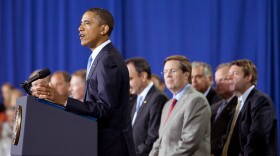A new study says the U.S. Environmental Protection Agency should consider the effects of burning fossil fuels on children in its regulation process - and not just adults, as it mainly does now.
The study conducted a systematic review of scientific literature on the effects on children's development and health from pollutants from fossil fuels.
Those pollutants include particulate matter, powerful toxins known as polycyclic aromatic hydrocarbons, and nitrogen dioxide, as well as carbon dioxide, which is warming the planet.
The pollution is linked to serious problems in children, according to lead researcher Frederica Perera, Director of the Columbia Center for Children's Environmental Health. But she says the EPA doesn't consider many of those effects when it conducts cost-benefit analyses on fossil fuels like oil, natural gas, and coal.
"Fossil fuel pollution includes associations with pre-term birth and low birth weight," Perera says. "Also, neurodevelopmental problems in children, such as reduced IQ, autism, and ADHD -- and not only asthma exacerbation or attacks, but also new cases of asthma."
The study also points out the grave risks to children from climate change.
As a major driver of climate change, combustion of fossil fuel is also directly and indirectly contributing to illness, injury, death, and impaired mental health in children through more frequent and severe heat events, coastal and inland flooding, drought, forest fires, intense storms, the spread of infectious disease vectors, increased food insecurity, and greater social and political instability.
Perera hopes the study will spur the U.S. to much more rapidly replace fossil fuels with renewables, such as advanced batteries, solar, wind, and energy efficiency. She says cities and states in the U.S. can take action, despite the lack of leadership from the Trump administration.
"We know how to do this," she says. "Other countries are taking action, all around the world. They realize that the future for a healthy environment, healthy children, is with these new technologies, away from fossil fuel burning."











